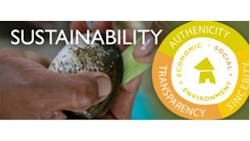L’Oreal, Avery Dennison Join to Reduce Environment Impact of Labels
With the goal of continuing to enable a sustainable supply chain, Avery Dennison and L’Oreal have created a tool to help reduce the environmental impacts of packaging labels throughout the entire label lifecycle.
“We strongly believe in a sustainable supply chain, and this is ingrained in our business practices,” said David Wolbach, assistant vice president – Packaging Hair – L’Oreal Americas. “However, to achieve the ultimate goal of reduced-impact materials, we cannot work alone. It is essential that all facets of the value chain – material suppliers, printers, consumers, and recyclers – collaborate together to establish a clear and transparent low-impact product stream globally.”
The two companies collaborated and produced the Avery Dennison Greenprint assessment shows to show thinner label materials can reduce environmental impacts.
According to L’Oreal, the assessment allows them to look at impact of its label materials, including the raw material extraction, manufacturing, and ultimately the label’s end-of-life. This approach is able to identify where the biggest environmental impacts lie and to devise strategies on how best to mitigate these impacts.
This method guided L’Oreal in its decision to transition the labels for some of its leading to Avery Dennison’s Global MDO substrate, which is designed to lead to significant reductions in greenhouse gas emissions, water consumption and waste generated in disposal.
By switching from Global Co-Ex film product to Global MDO, L’Oreal has reduced environmental impacts from 7% to 19% across the categories of fossil material, water use, energy use, GHG emissions and solid waste.
